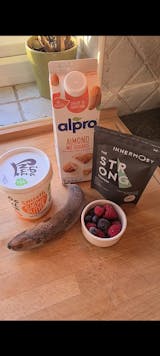We sat down with Innermost Insider and mindful wellness advocate Anj Magecha, who shares how she stays on track with new goals and habits whilst remaining true to herself, and what to do when faced with setbacks.
Hey Anj! Can you introduce yourself to our readers?
How did you become an Innermost Insider and what’s your goal as an ambassador for the brand?
I’ve been a Innermost user since I joined F45 TCR in 2018, I was new to the gym, vegan, and in need of some serious protein intake to pack on muscle— at a time where most vegan protein powders were a bit rubbish! I also run on caffeine and hate coffee so got hooked on the pre-workout to fuel going to the gym, uni, working at lululemon and a busy social life!
I joined the Insider program as soon as I was able to, and have seen so much growth for the brand since then! I love all the extra merch, the sweatshirt and duffel are essential - so would love to see more of my go to gym bag essentials become Innermost 👀
Our topic this month is resolution. How would you personally define resolution and has it been a pivotal part of your life?
Resolution means taking control of your own life and making conscious choices that lead you towards the often intangible ‘better’. It's about having the determination and drive to create the future you want for yourself, and accepting the task of navigating the challenges that come your way.
To me, resolution is about being true to myself and living with purpose. It's about not letting fear or doubt hold me back, but instead trusting in my own strength and abilities to overcome any obstacle even when it feels like it’s too difficult, or unfair.
To be resolute requires a strong sense of self-discipline and self-control, as well as a clear vision of what you want to achieve. It requires a sense of resilience and adaptability, and the understanding that things sometimes get worse when they get better.
Resolution has showed up for me in my journey with eating disorder recovery and weight restoration, with difficult conversations with therapists, even with holding boundaries with friends when sometimes it feels easier to let things slide. It’s not just about the big things!
Ultimately, resolution is about living a life that is authentic, meaningful, and fulfilling. It's about having the conviction to pursue my passions and make a positive impact on the world around me.
How do you go about setting goals in your life?
So this is an interesting one. I suck at New Years resolutions. Or so I thought. With a background in disordered eating and a late diagnosis of ADHD I can retrospectively look back at some of my new years resolutions and understand why they felt so insurmountable.
To keep it brief, they were generally unrealistic, overly restrictive or prescriptive, and boring. And to be honest, sometimes goals aren’t going to be exciting.
I’ve read quite extensively around habit forming and achievement and currently quite like the 12 week year format (it’s a book, decent read but for a short version there’s a video on my TikTok!) The 12 week year has really resonated with me - it's all about focusing on what's most important and taking consistent, small steps towards achieving your goals over the course of three months, and then re-evaluating. So a year long goal gets broken into 4 three-month goals, then 12 one-month goals, and so on, until the minutiae of daily habits.
-
It helps you focus on what matters most
-
It keeps you accountable
-
It allows for flexibility
-
It helps you make progress faster
Do you ever struggling with sticking to your goals and resolutions? How do you overcome setbacks?
Overcoming setbacks in pursuit of your goals can be tough, but it's also an essential part of the journey towards success. Every challenge and obstacle presents an opportunity to learn, grow, and become stronger. I am a very emotionally driven person, when I get sad or anxious or I’m face with a negative life event, my goals are quite easily derailed.
So for me it’s important to allow myself time to recuperate after a major setback, as it can be emotionally and physically draining to deal with challenges and obstacles. Taking a break to rest and recharge helps refocus and regain energy and motivation.I practice self-compassion and am not afraid to reach out for support when things feel overwhelming. I’m also a strong believer in setting boundaries for myself to protect my time and energy.
Naturally some setbacks are less personal, things like the pandemic or tube strikes. In those cases I try to keep things in perspective: an old manager at lululemon used to say, at the end of the day, it’s just black stretchy pants and I apply that thinking to most areas of my life.
Don't let setbacks define who you are or what you're capable of. Instead, use them as an opportunity to learn and grow.
Are there certain times where you feel more motivated to set goals or resolutions?
Naturally times like birthdays and new years have loads of messaging around goals and time passing, but in my experience I find birthday goals and new years goals are just that. They exist until I feel less festive and then things get difficult. I find the goals that come to me in the other 75% of the year are actually more in line with what makes me feel happy and healthy. The 12 week year method really helps facilitate this for me.
Furthermore according to a study published in the journal Advances in Experimental Social Psychology, people are more likely to succeed in their goals when they start working towards them immediately, rather than waiting for a specific time (like the new year) to begin. When we set a goal, we often have a burst of motivation and energy that can drive us to take initial steps towards achieving it. By waiting to start working on our goals, we risk losing that initial motivation and energy, which can make it harder to get started. So why wait for the new year to make changes that will make you happy?
What advice would you give to others about setting goals and resolutions for the future?
Check in with yourself to make sure your goals are your own and not what you think people expect from you. And don’t be afraid to set goals that people aren’t going to see happen, there have been points in my life where my goal has been to get out of bed every day for a week and they were probably more difficult and transformative than any weight loss or fitness goal I’ve set for myself.
Do you have any important personal resolutions for the next year?
I have some goals from my previous 12 week cycle, including the turf games in summer 2023 hopefully, which naturally lends itself to some commitments around training style and frequency.
I think saying no more often is a big one for me. Not to everything by any means but I do a lot of things that I think I ‘should’ do and I usually go in eyes wide open knowing it’ll leave me not feeling great. So hopefully this year I’ll have the resolve to just say no straight off the bat!
That's a wrap! To keep up with Anj, check out her Instagram and TikTok.























